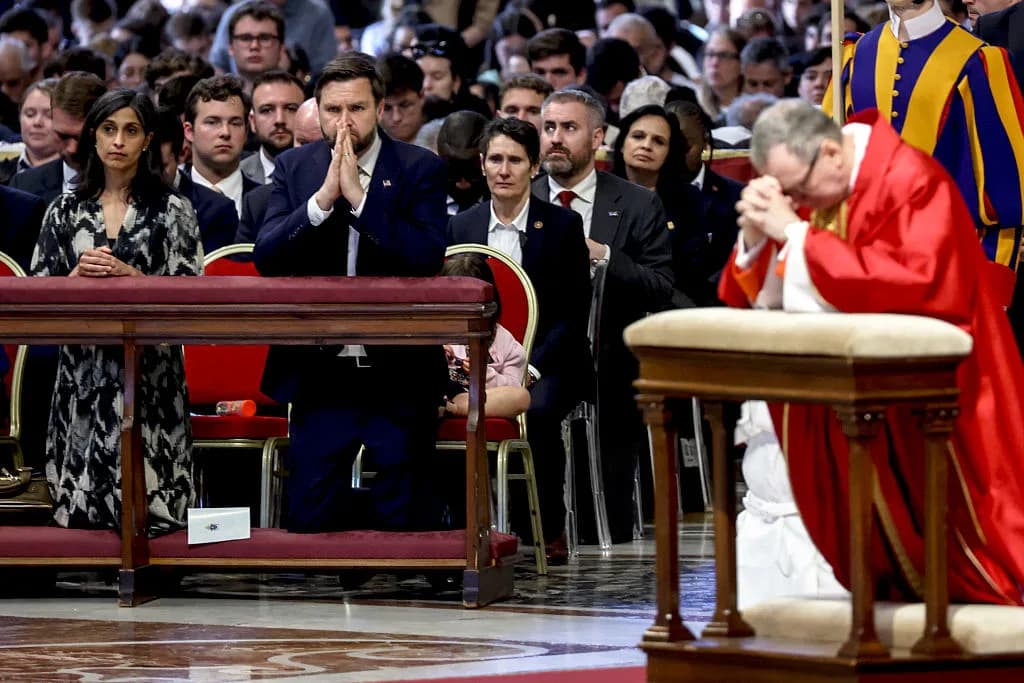We're loading the full news article for you. This includes the article content, images, author information, and related articles.
A US Vice President's public remarks about his Hindu wife's faith have ignited an international firestorm, raising complex questions for multi-religious nations like Kenya about the intersection of private belief, public life, and interfaith respect.

GLOBAL — A statement by United States Vice President JD Vance expressing his hope that his Hindu wife, Usha Vance, will one day convert to Christianity has triggered a fierce international debate online, drawing both sharp criticism and vocal defence. The controversy erupted following Vance’s appearance at a Turning Point USA event in Mississippi on Wednesday, October 29, 2025, EAT, placing the dynamics of high-profile interfaith marriages under intense public scrutiny.
During a question-and-answer session, Vance, who was raised Protestant before converting to Catholicism in 2019, was asked about navigating his faith within his marriage. In response, he acknowledged their different backgrounds and stated their children were being raised Christian. He then added, “Do I hope eventually that she is somehow moved by the same thing that I was moved in by church? Yeah, I honestly do wish that, because I believe in the Christian Gospel, and I hope eventually my wife comes to see it the same way.” He concluded by noting, “But if she doesn’t, then God says everybody has free will, and so that doesn’t cause a problem for me.”
The comments quickly spread across social media platforms, where critics accused the Vice President of publicly disrespecting his wife's religion. Suhag Shukla, executive director of the Hindu American Foundation, told The New York Times that the remarks implied, “my wife, this aspect of her is just not enough.” Others labelled the statement a public act of “throwing his wife’s religion under the bus” for political gain among conservative Christian voters.
In a statement posted on X (formerly Twitter) on Friday, October 31, 2025, EAT, Vance defended his comments, attributing the backlash to “anti-Christian bigotry.” He wrote, “My Christian faith tells me the Gospel is true and is good for human beings,” and clarified that his wife, who he said encouraged his return to faith, “is not a Christian and has no plans to convert.” Usha Vance has previously stated that while their children are exposed to Christianity, they also have “plenty of access to the Hindu tradition.”
While the political storm unfolds thousands of kilometres away, the incident holds significant relevance for Kenya, a nation with a deeply religious and diverse populace. According to recent data, Kenya's population is predominantly Christian (approximately 85.5%), with a significant Muslim minority (10.9%) and smaller communities of Hindus, Sikhs, and followers of traditional religions. In this context, interfaith relationships are a lived reality for many, governed by both cultural norms and a robust legal framework.
The Constitution of Kenya, under Article 32, explicitly guarantees freedom of conscience, religion, belief, and opinion for every person. It prohibits discrimination on religious grounds and ensures the right to manifest any religion or belief. Furthermore, the Marriage Act of 2014 provides a legal framework for interfaith unions, which can be conducted as civil ceremonies, recognised as neutral and universal, or under the rites of one of the partner's faiths.
However, legal recognition does not always erase societal challenges. Couples in interfaith marriages in Kenya sometimes face family opposition and must navigate complex issues regarding inheritance and the religious upbringing of children. A 2019 study of interfaith marriages across 15 sub-Saharan African nations found that while they are not uncommon, they occur less frequently than interethnic unions, with Muslim-Christian marriages being particularly rare.
The public nature of Vance's comments—a political leader openly expressing a desire for his spouse's conversion—touches upon sensitivities that resonate within Kenyan society. Public declarations on faith by leaders are closely watched, and a similar statement by a prominent Kenyan figure could easily be interpreted as an assertion of religious superiority, potentially straining the delicate fabric of religious coexistence. It raises analytical questions about the line between personal testimony and public pressure, a distinction critical in maintaining harmony in a pluralistic state.
The controversy surrounding the Vances serves as a powerful case study on the complexities of faith in the public square. For Kenyans, it underscores the importance of the nation's constitutional protections for religious freedom and highlights the ongoing, often private, negotiations that define interfaith life in East Africa and across the globe.
Keep the conversation in one place—threads here stay linked to the story and in the forums.
Sign in to start a discussion
Start a conversation about this story and keep it linked here.
Other hot threads
E-sports and Gaming Community in Kenya
Active 9 months ago
The Role of Technology in Modern Agriculture (AgriTech)
Active 9 months ago
Popular Recreational Activities Across Counties
Active 9 months ago
Investing in Youth Sports Development Programs
Active 9 months ago